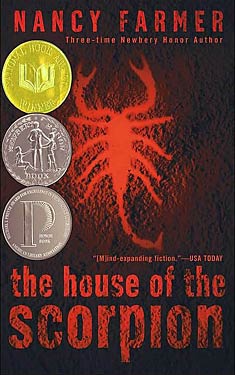
Added By: Administrator
Last Updated: Engelbrecht
The House of the Scorpion
| Author: | Nancy Farmer |
| Publisher: |
Atheneum, 2002 |
| Series: | The House of the Scorpion: Book 1 |
|
1. The House of the Scorpion |
|
| Book Type: | Novel |
| Genre: | Science-Fiction |
| Sub-Genre Tags: | Near-Future Mutants Alternate History (SF) |
| Awards: | |
| Lists: | |
| Links: |
|
| Avg Member Rating: |
|
|
|
|
Synopsis
Matteo Alacrán was not born; he was harvested.
His DNA came from El Patrón, lord of a country called Opium--a strip of poppy fields lying between the United States and what was once called Mexico. Matt's first cell split and divided inside a petri dish. Then he was placed in the womb of a cow, where he continued the miraculous journey from embryo to fetus to baby. He is a boy now, but most consider him a monster--except for El Patrón. El Patrón loves Matt as he loves himself, because Matt is himself.
As Matt struggles to understand his existence, he is threatened by a sinister cast of characters, including El Patrón's power-hungry family, and he is surrounded by a dangerous army of bodyguards. Escape is the only chance Matt has to survive. But escape from the Alacrán Estate is no guarantee of freedom, because Matt is marked by his difference in ways he doesn't even suspect.
Excerpt
Chapter 1: In the Beginning
In the beginning there were thirty-six of them, thirty-six droplets of life so tiny that Eduardo could see them only under a microscope. He studied them anxiously in the darkened room.
Water bubbled through tubes that snaked around the warm, humid walls. Air was sucked into growth chambers. A dull, red light shone on the faces of the workers as they watched their own arrays of little glass dishes. Each one contained a drop of life.
Eduardo moved his dishes, one after the other, under the lens of the microscope. The cells were perfect -- or so it seemed. Each was furnished with all it needed to grow. So much knowledge was hidden in that tiny world! Even Eduardo, who understood the process very well, was awed. The cell already understood what color hair it was to have, how tall it would become, and even whether it preferred spinach to broccoli. It might even have a hazy desire for music or crossword puzzles. All that was hidden in the droplet.
Finally the round outlines quivered and lines appeared, dividing the cells in two. Eduardo sighed. It was going to be all right. He watched the samples grow, and then he carefully moved them to the incubator.
But it wasn't all right. Something about the food, the heat, the light was wrong, and the man didn't know what it was. Very quickly over half of them died. There were only fifteen now, and Eduardo felt a cold lump in his stomach. If he failed, he would be sent to the Farms, and then what would become of Anna and the children, and his father, who was so old?
"It's okay," said Lisa, so close by that Eduardo jumped. She was one of the senior technicians. She had worked for so many years in the dark, her face was chalk white and her blue veins were visible through her skin.
"How can it be okay?" Eduardo said.
"The cells were frozen over a hundred years ago. They can't be as healthy as samples taken yesterday."
"That long," the man marveled.
"But some of them should grow," Lisa said sternly.
So Eduardo began to worry again. And for a month everything went well. The day came when he implanted the tiny embryos in the brood cows. The cows were lined up, patiently waiting. They were fed by tubes, and their bodies were exercised by giant metal arms that grasped their legs and flexed them as though the cows were walking through an endless field. Now and then an animal moved its jaws in an attempt to chew cud.
Did they dream of dandelions? Eduardo wondered. Did they feel a phantom wind blowing tall grass against their legs? Their brains were filled with quiet joy from implants in their skulls. Were they aware of the children growing in their wombs?
Perhaps the cows hated what had been done to them, because they certainly rejected the embryos. One after another the infants, at this point no larger than minnows, died.
Until there was only one.
Eduardo slept badly at night. He cried out in his sleep, and Anna asked what was the matter. He couldn't tell her. He couldn't say that if this last embryo died, he would be stripped of his job. He would be sent to the Farms. And she, Anna, and their children and his father would be cast out to walk the hot, dusty roads.
But that one embryo grew until it was clearly a being with arms and legs and a sweet, dreaming face. Eduardo watched it through scanners. "You hold my life in your hands," he told the infant. As though it could hear, the infant flexed its tiny body in the womb until it was turned toward the man. And Eduardo felt an unreasoning stir of affection.
When the day came, Eduardo received the newborn into his hands as though it were his own child. His eyes blurred as he laid it in a crib and reached for the needle that would blunt its intelligence.
"Don't fix that one," said Lisa, hastily catching his arm. "It's a Matteo Alacrán. They're always left intact."
Have I done you a favor? thought Eduardo as he watched the baby turn its head toward the bustling nurses in their starched, white uniforms. Will you thank me for it later?
Copyright © 2002 by Nancy Farmer
Reviews
Images
No alternate cover images currently exist for this novel.



















 Full Details
Full Details






